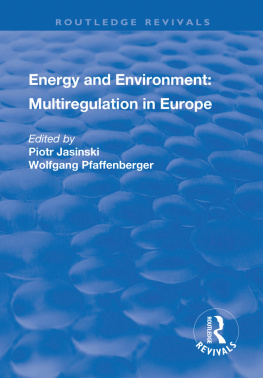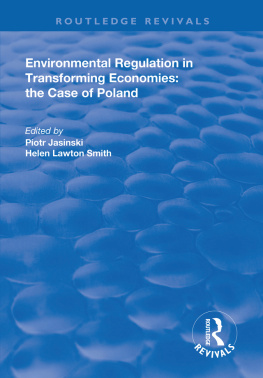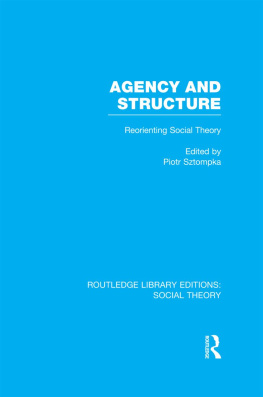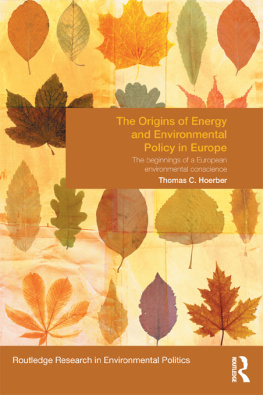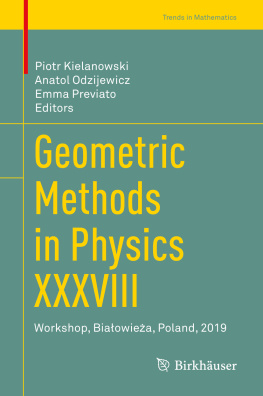ENERGY AND ENVIRONMENT: MULTIREGULATION IN EUROPE
Energy and Environment: Multiregulation in Europe
Edited by
Piotr Jasinski
Oxecon Consulting, Oxford
Wolfgang Pfaffenberger
University of Oldenburg
First published 2000 by Ashgate Publishing
Reissued 2018 by Routledge
2 Park Square, Milton Park, Abingdon, Oxon OX14 4RN
711 Third Avenue, New York, NY 10017, USA
Routledge is an imprint of the Taylor & Francis Group, an informa business
Copyright Piotr Jasinski and Wolfgang Pfaffenberger 2000
All rights reserved. No part of this book may be reprinted or reproduced or utilised in any form or by any electronic, mechanical, or other means, now known or hereafter invented, including photocopying and recording, or in any information storage or retrieval system, without permission in writing from the publishers.
Notice:
Product or corporate names may be trademarks or registered trademarks, and are used only for identification and explanation without intent to infringe.
Publisher's Note
The publisher has gone to great lengths to ensure the quality of this reprint but points out that some imperfections in the original copies may be apparent.
Disclaimer
The publisher has made every effort to trace copyright holders and welcomes correspondence from those they have been unable to contact.
A Library of Congress record exists under LC control number: 00134480
ISBN 13: 978-1-138-74106-5 (hbk)
ISBN 13: 978-1-315-18304-6 (ebk)
Remigijus Ciegis and Vidmantas Jankauskas Kaunas, Lithuania
Piotr Jasinski Oxford, England
Francis McGowan Sussex, England
Wolfgang Pfaffenberger, Christoph Otte Oldenburg, Germany
Cathryn Ross Oxford, England
Wolfgang Schulz Bremen, Germany
Miroslaw Sobolewski and Tomasz Zylicz Warsaw, Poland
Over the last twenty years, the concern with market liberalization and environmental protection to some extent shifted the emphasis of energy policy away from planning techniques towards regulation. The means as well as the ends of energy policy were changing. Thus market liberalization (and associated policies of privatization and corporate restructuring) often required the evolution of an explicit system of economic regulation, backed up by the application of competition policy while environmental protection was often pursued by a variety of regulatory mechanisms (including the establishment of independent monitoring agencies). Regulation rather than ownership, taxation or direct intervention became the principle mechanism of policy. However the regulatory processes were often very different models of economic regulation erred towards simplicity (or as much as was possible), leaving producers and consumers with considerable autonomy, while environmental models were often premised on technical standard setting, implemented in a somewhat heavy-handed way.
Moreover the contrasting regulatory styles went deeper, encompassing conflicts of principle. To put it simply, if regulation for market liberalization was concerned to reduce energy prices, the environmental perspective was concerned with increasing them (or at least with the aim of imposing the full environmental costs of energy production upon consumers to encourage them to use energy in more environmentally friendly ways). Of course many argue that such conflicts need not necessarily happen - if negative externalities are internalized into prices in an 'economic' manner then there is no clash between the goals of environmental protection and an open market. Yet in practice the goals have often clashed not least because of the very different perspectives and interests of those engaged in the policy debate on these issues
These developments resulted in. there appearing the problem of multiregulation: environmental and energy regulation (and policies for that matter) had to be harmonised, and so had to be the EU and national level. The former was partly a consequence of growing awareness of environmental problems and of liberalisation of the energy sector in which the old model of regulation through public ownership was no longer appropriate. At the same time, the European Commission was worried that divergent national approaches to these problems would result in considerable distortions. The papers presented in this volume show how real and difficult these issues were and still are.
Coal, electricity and non-fossil energy sources are the sectors where the conflicts between different regulatory and energy policy objectives are most apparent. In each of them EU policies have attempted to address the shortcomings (whether in competition or environmental terms) and to solve any conflicts that might have appeared.
The coal sector illustrates the conflicts between different energy objectives. On the one hand, there is a significant solid fuel resource within the EU, one which arguably contributes to a degree of energy self-sufficiency. On the other hand, that resource is both relatively expensive vis a vis external competitors - and highly polluting. Thus the traditional arguments for supporting the sector appear to be overruled by other concerns. Unless serious energy market disruption takes place in the next few years the steady erosion of coal's place in EU energy balances seems inevitable.
An agreement to liberalize the electricity market was eventually reached in 1996 after further watering down of the original proposal: competition was only to be introduced for the largest consumers with a gradual opening of the market over nine years. Countries were to be able to opt for either 'negotiated third party access' or a 'single buyer' system (the latter preserving to some extent the position of the single vertically integrated utilities which enjoy a near monopoly in some member states), though in both cases the different components of the market (production, transmission and distribution) had to be 'unbundled' (a separation of accounts for each component). While the agreed reforms fall short of outright deregulation, it is clear that many member states are considering (and some such as the UK and Sweden have already implemented) more radical reforms.
At the same time however, the environmental consequences of power generation have also been considered. Starting with attempts to limit emissions of sulfur dioxide in the 1980s (a measure which focused on power plants though not exclusively), the Commission has sought to encourage cleaner generation of power.
What determined how individual Member States approached various aspects of the problem of multiregulation was that their priorities differed considerably and so did the speed with which they introduced market reforms in their energy sectors. The United Kingdom definitely led the way as far as the latter is concerned, and environmental pressures seemed to have been much stronger in Germany,
The problem of multiregulation in Germany currently materialises itself in the form of two debates: on energy efficiency and on support to renewable energy sources on the one hand and on introducing energy taxation outside of the transport sector on the other hand. After a break of several years, energy efficiency is again becoming a subject matter of academic and political discussion. This time however, in contrast with the 1970s, the whole issue cannot be simply reduced to the necessity to respond to an increase in energy prices. In nominal terms, oil prices are at the same level as ten years ago, which means that in real terms they fell considerably. The renewed interest in energy efficiency cannot be explained by energy prices for consumers either, as intemalisation of external costs has not yet taken place. On the other hand, the problem of exhaustible energy raw materials is not pressing at the moment because every year the amounts discovered exceed those extracted and consumed.


